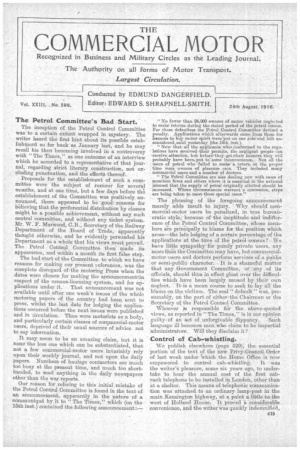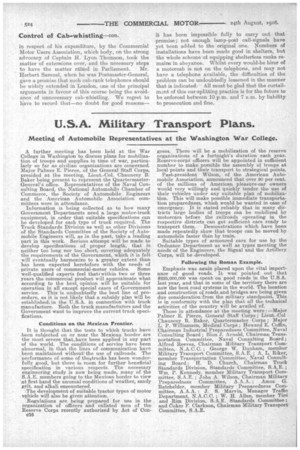The Petrol Committee's Bad Start
Page 1

Page 2

If you've noticed an error in this article please click here to report it so we can fix it.
The inception of the Petrol Control Committee was to a certain extent wrapped in mystery. The writer heard the first hint about its possible establishment so far back as January last, and he may recall his then becoming involved in a controversy with " The Times," as one outcome of an interview which he accorded to a representative of that journal, regarding strict literary construction, not exeluding punctuation, and the effects thereof.
Proposals for the establishment of such a committee were the subject of rumour for several months, and at one time, but a few days before the establishment of the Committee was positively, announced, there appeared to be good. reasons for believing that the preferential distribution by classes might be a possible achievement, without any such central committee, and without any ticket system. Mr. W: F. Marwood, C.B., Secretary of the Railway Department of the Board of Trade, apparently thciught otherwise, and he evidently persuaded his Department as a whole that his views must prevail. The Petrol Control Committee then made its appearance, and within a month its first ,false step. The bad start of the Committee. to which we have reasons for making our present Leferences, was the complete disregard of.the motoring Press when the dates were chosen for making the announcement(in respect of the census-licensing system, and for applications under it. That announcement was not available until after one week's issues of the whole motoring papers of the country had been sent to press, whilst the last date for lodging the applications occurred before the next issues were published and in "3irculation. Thus were motorists as a body, and particularly certain classes of commercial-motor users, deprived of their usual sources of advice not to say information.
It may seem to be an amazing claim, but it is none the less one which can be substantiated, that not a few commercial-motor users invariably rely upon their weekly journal, and not upon the daily papers. Numbers of haulage contractors are much too busy at the present time, and much too shorthanded, to read anything in the daily newspapers other than the war reports.
Our reason for refering to this initial mistake of the Petrol Central Committee is found in the text of an announcement, apparentlY in the nature of a communique by it to "The Times, which (on the 15th inst.) contained the following announcement " No fewer than 24,000 owners of motor vehicles neglected to make returns during the stated period of the petrol census. For these detaulteus the Petrol.Control Committee devised a penalty. Applications which afterwards came,from them for lisenoes to buy motor spirit Were:put on. one siderand left un-, considcred,until yesterday (the .14th inst.). "Now that all tho applicants who& Conformed to the regm. ' lations have received-their permits, the, negligent people, can -receive attention, but beforeothey.get dheir licences they will . probably have been,put to'some moonvenience. Not all the , users of petrol who -failed -to make -a return, at the proper time were owners of pleasure cars. They included many
oommercial users and a number of doctors. .
"The Petrol Committee are also dealing now with cases of munition firms and others where it is essential in-tho national interest that the supply of petrol originally allotted should be increased. Where circumstances warrant a concession, steps are being taken to meet these special cases."
The phrasing of the foregoing announcement merely adds insult to injury. Why, should conimercial-motor users be penalized, in true bureau' cratic style, because of the ineptitude and indifference of the Petrol Control Committee, whose members are principally to blame for the position which arose—the late lodging of a certain percentage of the applications at the time of the petrel consus? We • have little sympathy for purely private users, any more than the Conimittee may have, but commercialmotor-users and doctors perform services of a public or semi-public character. It is a shameful matter that any Government Committee, of any of its officials, should tilts in effect gloat over the difficulties which have been largely, caused by their own neglect. It.is a mean course to seek to lay all the blarne on. ihe victims. The real " default" was, pre . sumably, on the part of eithentheChairman or the Seem-La-1-y of the Petrol Control Committee. Whoever is responsible 16r the above-quoted views, as reported in "The Times," is in our opinion guilty ,of an act of unforgivable flippancy. Such language ill becomes men who claim to be impartial 'administrators. Will they disclaim it ?
'Control of Cab-whistling.
We publish elsewhere (page 629), the essential portion of the text of the new Privy-Council Order of last week under Which the Home Office is now empowered to control cab-whistling. ' It 'was the writer's pleasure, some six years ago, to undertake to bear the annual cost of the first cabrank telephone to be installed in London, other than at a shelter. This means of telephonic communication was attached to an ordinary lamp-post in the _main Kensington highway, at a point a little to the west of Holland House. It proa'ed a considerable convenience, and the writer was quickly indemnified,
in respect of his expenditure, by the Commercial Motor Users Association, which body, on the strong advocacy of Captain H. Lyon Thomson, took the matter of extensions over, and the necessary steps to have the matter ralged in Parliament. Mr. Herbert Samuel, when he was Postmaster-General, gave a promise that such cab-rank telephones should be widely extended in London, one of the principal arguments in favour of this course being the avoidance of unnecessary cab-whistling. We regret to have to record that—no doubt for good reasons
it has been impossible fully to carry out that promise; not enough Iamp-poSt call-signals have yet been added to the original one. Numbers of installations have been made good in shelters, but the whole scheme of equipping shelterless ranks remains in abeyance. Whilst every would-be hirer of a motoreab is not on the telephone, and may not have a telephone available, the difficulties of the problem can be undoubtedly lessened in the manner that is indicated. All must be glad that the curtailmant of this ear-splitting practice is for the future to be enforced between 10 p.m. and 7 a.m. by liability to prosecution and fine.




















